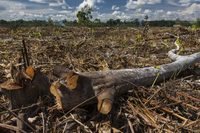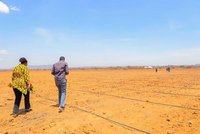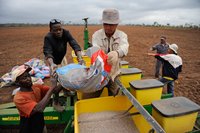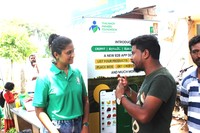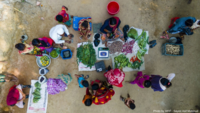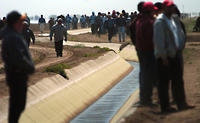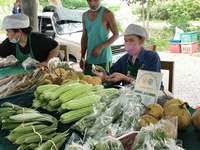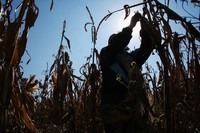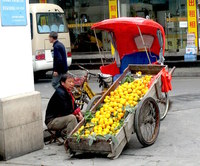by GRAIN | 26 Mar 2024 Land
Oil palm plantations in Latin America have quadrupled. Demand is driven by the relatively low price of palm oil and its multiple uses. This crop is creating constant conflicts on peasant, indigenous and Afro-descendant lands.
Oil palm plantations in Latin America have quadrupled. Demand is driven by the relatively low price of palm oil and its multiple uses. This crop is creating constant conflicts on peasant, indigenous and Afro-descendant lands.
by GRAIN | 27 Feb 2024 Supermarket Watch Asia
In this edition we see how in India and China, local markets and street food vendors in Asia that operate outside the corporate system are already finding creative ways to reduce their plastic waste and develop solutions that support people's livelihoods and food needs.
In this edition we see how in India and China, local markets and street food vendors in Asia that operate outside the corporate system are already finding creative ways to reduce their plastic waste and develop solutions that support people's livelihoods and food needs.
by GRAIN | 15 Feb 2024 Climate
UN climate talks are increasingly being used to cut carbon deals, not emissions. This is the Davos-isation of COP. In this article, GRAIN looks at how this corporate capture played out in the area of food and agriculture, the source of one-third of global emissions.
UN climate talks are increasingly being used to cut carbon deals, not emissions. This is the Davos-isation of COP. In this article, GRAIN looks at how this corporate capture played out in the area of food and agriculture, the source of one-third of global emissions.
by GRAIN and La Via Campesina Southern and Eastern Africa | 2 Feb 2024 Land
Tanzania’s experience in the global land grab post-2008 led to shattered hopes, land conflicts & misery for small farmers. Yet, the current govt risks repeating history. A new report looks at this critical moment for Tanzania's small farmers & pastoralists.
Tanzania’s experience in the global land grab post-2008 led to shattered hopes, land conflicts & misery for small farmers. Yet, the current govt risks repeating history. A new report looks at this critical moment for Tanzania's small farmers & pastoralists.
by GRAIN | 25 Jan 2024 Corporations
Ten years into the Belt and Road Initiative projects, the expansion of corporate investments in the global agri-food system has reached new heights. As evidenced in this GRAIN report, it is hard to find anything “green” or small-scale about the BRI's plans in agriculture, fisheries and e-commerce.
Ten years into the Belt and Road Initiative projects, the expansion of corporate investments in the global agri-food system has reached new heights. As evidenced in this GRAIN report, it is hard to find anything “green” or small-scale about the BRI's plans in agriculture, fisheries and e-commerce.
by GRAIN | 29 Nov 2023 Supermarket Watch Asia
E-commerce continues to expand rapidly into food distribution and retail across Asia, speeding up corporate control. These digital platforms increase the pricing power corporations have over farmers and enable them to bring workers in the food system under the control of invisible command centers.
E-commerce continues to expand rapidly into food distribution and retail across Asia, speeding up corporate control. These digital platforms increase the pricing power corporations have over farmers and enable them to bring workers in the food system under the control of invisible command centers.
by GRAIN | 16 Nov 2023 Climate
It is now common knowledge that we have to transform both how we produce and how we use energy to disrupt the current trajectory of climate change. Simply switching from “polluting” energy sources to “clean” ones will not work. We actually have to produce and use less energy altogether if we are to keep our planet liveable while fighting for justice and equity in terms of who can access and consume energy.
It is now common knowledge that we have to transform both how we produce and how we use energy to disrupt the current trajectory of climate change. Simply switching from “polluting” energy sources to “clean” ones will not work. We actually have to produce and use less energy altogether if we are to keep our planet liveable while fighting for justice and equity in terms of who can access and consume energy.
by GRAIN | 21 Sep 2023 Land
Pension fund managers, private equity firms and other financial players are moving aggressively to snatch up lands around the world with access to water for irrigation. Their strategy is to pump as much water as they can and as fast as they can into the production of crops, like fruits and nuts, that reap high prices in export markets.
Pension fund managers, private equity firms and other financial players are moving aggressively to snatch up lands around the world with access to water for irrigation. Their strategy is to pump as much water as they can and as fast as they can into the production of crops, like fruits and nuts, that reap high prices in export markets.
by GRAIN | 31 Aug 2023 Supermarket Watch Asia
Following the work of many others who have been organising and working with market traders and street vendors, two important issues come to the forefront: one is the fight against harassments and evictions of small food traders; the other is the fight for social protection such as access to health services and income security.
Following the work of many others who have been organising and working with market traders and street vendors, two important issues come to the forefront: one is the fight against harassments and evictions of small food traders; the other is the fight for social protection such as access to health services and income security.
by GRAIN | 31 Jul 2023 Corporations
One of the main objectives of the African Development Bank is to transform African agriculture by moving towards "agro-industrialisation". Who are the actors who benefit the most? What are the implications for the peasantry?
One of the main objectives of the African Development Bank is to transform African agriculture by moving towards "agro-industrialisation". Who are the actors who benefit the most? What are the implications for the peasantry?
by GRAIN | 18 Jul 2023 Seeds
A months-old conflict is pitting Mexico against the USA over the acceptance or rejection of biotech imports. Mexico wants to ban GM corn imports for direct human consumption. The USA is threatening sanctions.
A months-old conflict is pitting Mexico against the USA over the acceptance or rejection of biotech imports. Mexico wants to ban GM corn imports for direct human consumption. The USA is threatening sanctions.
by GRAIN | 29 May 2023 Supermarket Watch Asia
Some have adopted terms like “solidarity economy” or “people’s sector” to more accurately convey the important role that the workers of the so-called "informal sector" play in the local economy and their key contribution in providing food to everyone. In this edition of the bulletin, we share stories of resilient Palestinian women farmers producing food boxes and of farmers in Laos using strategies to market their products in the face of a fuel price spike.
Some have adopted terms like “solidarity economy” or “people’s sector” to more accurately convey the important role that the workers of the so-called "informal sector" play in the local economy and their key contribution in providing food to everyone. In this edition of the bulletin, we share stories of resilient Palestinian women farmers producing food boxes and of farmers in Laos using strategies to market their products in the face of a fuel price spike.
by GRAIN & Colectivo por la Autonomía | 4 May 2023 Land
Avocados are the world’s third-largest fruit commodity. Their production is taking up an ever-growing area and continually expanding into new countries. What are the implications? What forces are driving it? How does this model, working on both global and local scales, manage to keep prices high?
Avocados are the world’s third-largest fruit commodity. Their production is taking up an ever-growing area and continually expanding into new countries. What are the implications? What forces are driving it? How does this model, working on both global and local scales, manage to keep prices high?
